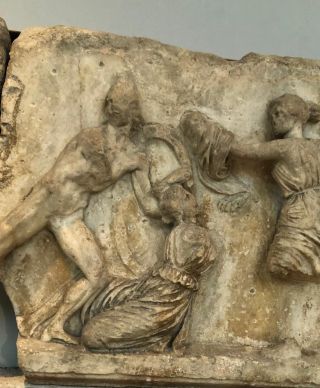Ethics and Morality
Good Values, Good Character, and Good Deeds
Ryan Holiday explains how we can try to be just in his new book.
Updated August 9, 2024 Reviewed by Lybi Ma
Key points
- Stoic ethics is not simple self-improvement advice.
- Stoicism requires that agents be just.
- Contemporary accounts of justice may not require much of us in terms of personal ethics.

If you are lucky, you are there for the moment when it becomes clear your teenager is becoming a decent person. It is not enough to see what they do. To see them working hard, being polite, helping, or looking out for others might mean you are missing some context. Maybe you are assuming some noble explanation, and then you check in with your kid and get the real story. It's hard to simply see it from the outside.
But I was lucky and caught my kid responding to a small matter of justice in a way that, to me, indicated a lot. It is hard to explain. I don’t think I would try to without Ryan Holiday’s new book (and new NYTimes bestseller) in his Stoic Virtues series, “Right Thing, Right Now: Good Values, Good Character, Good Deeds.”
In this beautifully earnest book, Holiday makes the most plausible case for the (incredibly complex) moral psychology that undergirds virtue ethics, pointing out that it explains uncontroversial cases of impressive behavior. He doesn’t, of course, suggest Gandhi, Frederick Douglass, or any US presidents were Stoics, but explains how they similarly thought of justice and how that worked out.
Many of us recognize the moral psychology of virtue ethics, the idea that we build our characters by aiming to do the right thing while repeatedly trying to do the right thing. But it is not easy to put these ideas, even if we have them, into words. And it is hard to defend this account of how we are and how we grow against the very many others out there. So Holiday helps with that.
A second thing he helps with is fresh thought about justice. A Stoic account of justice is not how we standardly think of justice today. Most accounts of justice today (still being offered and refined by political philosophers and legal theorists) operate without tapping into personal behavior or anything like personal desires to be just.
And third? There can be no doubt in reading this book that Stoicism offers a philosophical framework, not dogma or conceptually naïve self-help. This is wonderful, and Holiday's new book might put to rest criticism about modern Stoicism confusing the ancient view for something like self-help. Instead, Stoicism is a set of long and conceptually complex arguments for being ethical, that is, supporting justice and acting justly towards others. Holiday manages to present Stoicism as a philosophy, not a list of tips. He makes it clear that we need to be philosophically proactive rather than obedient to some guru's advice and rather than being aloof and cynical. By being philosophically pro-active we need to be filling in inadequate accounts of what we are doing, and what we are doing here, with something better.
If we think of justice as only a matter of principle or even just institutional legal principles, we might be left contributing only when we vote (I remember a text in Ethics suggesting just this). But what if we recognize that justice is instantiated in our societies in various ways (always inadequately) and also a matter of choices we make throughout our day? How you treat your spouse. How you talk behind your friend’s back. How well you pay employees. How much you share.
It can seem off to think that the way we treat our mother-in-law is a matter of justice. But Holiday makes case after case for just this. The relationship between how we act and what we effectively agitate for is right there in historical examples of people who effectively agitated for improved justice. He cites them and their observers on how internalizing commitments to treating others well in the day-by-day was part of the same work.
There are reasons, of course, why we might be loathe to consider personal ethics as paired with political justice. For one, we sure have been fooled before, encouraged to ignore horrific injustice and pay attention to something (maybe anything) else. The hypocritical cruelty in how we conceived of personal morality in the very recent past still stings. And that we cannot possibly wait for us all to be well-motivated before we push for political justice. But given how resigned we seem to be to political dishonesty and corruption, we may have over-corrected as a polity if personal morality does not seem relevant at all.
Holiday makes it seem as if all we are missing, or waiting on, is a good working account of personal morality. And if that is the case, he shows us a way forward. He offers a solution we might mutually agree upon, whether you take yourself to be Stoic or not, updating examples from the ancient world so that they cover our situations right now. If your workplace does not have a code of ethics: create one, he suggests. Commit yourself to rules you make up such as I don’t cross picket lines.
One brilliant portion of the book points out that there is humility and courage in taking action for justice before we can assure anyone that we will make no mistakes. We could, instead sit back, be cynical about others (or ourselves), and keep our “hands clean.” But he provides examples of the ways people have motivated themselves to just try their best to help others. What if we do our duty with the proviso that we do it “as we best understand it?” Being open to correction, checking our motives, checking our take on justice—in doing this we might keep our “hands clean” and still be actively involved. This option is so much better (braver, more humble, more reasonable) than sitting around outraged by the very idea other people might affront us with "virtue signaling."
Another argument Holiday makes is that our own sense of justice should be merciful. There is room in the ancient accounts for a few ways to think of mercy, but Holiday, again, really models virtue ethics as a framework for figuring cases like these out, showing us that Stoicism is an assist to our moral reasoning and not a set of conclusions.
He considers the case of a woman who donated her kidney and was mocked for it by her famous writing group peers (one of them took the donor’s own words to use in dialogue in a story that mocked the ‘virtue signaling’ of a kidney donor). A Stoic approach might suggest the donor could prepare and expect this kind of treatment (I have talked to many donors and, so sadly, many of them do. Some even warn not to post on Facebook as people get jealous.). Instead, this donor took a stand against it, trying to fight it when Holiday suggests she might have been better off ignoring it, or rising above it.
His suggestion, of course, makes one consider why we even point out cruelty, sue, or call the police for much of anything at all. All good philosophical questions to ask ourselves! But I am not convinced a Stoic would need to be as passive as someone who is merciful when it comes to cruelty (dumb mistakes, I can see). Holiday concludes in this case that, in the end, it was "her call," that is the kidney donor was the one best able to decide whether to pursue justice against those who mocked her donation. Pointing out that a philosophical ethic leaves room for defending different responses is, again, very helpful encouragement. (For more on Stoic forgiveness see Jeremy Reid's exemplary scholarship here.)
When it comes to my kid, I was explaining that I was taking the day off to escort a new friend to her cancer appointments at the hospital. I got asked, by a well-meaning person (sometimes I am too nice), why I had to do that. Or why I was doing it. I think it went like this: Why? And my kid laughed.
And I was so proud to realize what that must have meant. He had taken the question itself to be an actual joke. This means he was doing what virtue ethics recommends: internalizing the idea that you help when you can, getting to the point where it is obvious that you do that. Just like it is for so many people who live their lives serving others (I think of clinicians in health care, teachers, first responders), at least most of the time, the question of why you are helping is not a live one, that ethical questions has been answered. So it's just silly and an attempt at humor to suggest otherwise. How good for my kid to see it this way and how good for (I hope) us. And now I have a book I’d like him to read.
References
Holiday, R. (2024). Right Thing, Right Now: Good Values. Good Character. Good Deeds. Random House.




